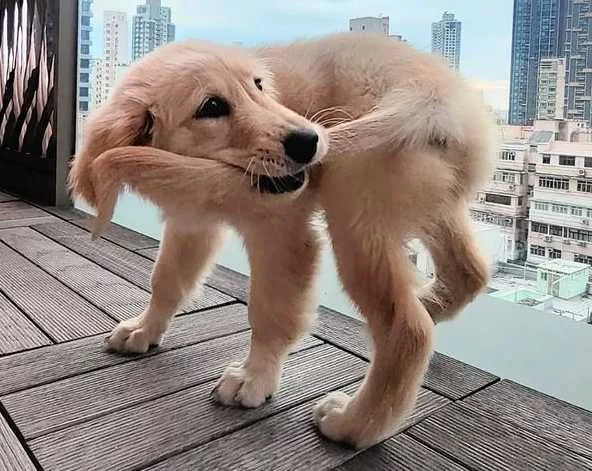Have you ever seen your dog go almost insane spinning around to bite its tail? It's a very common occurrence in dogs, as if a dog bites its tail it can be for a variety of reasons. We'll tell you all about it!
Why does my dog bite his tail?
As we said, there are usually several causes, so let's see what they are so that you can identify the one that affects your pet!
1. Parasites
The cursed parasites can be a source of despair for pets. The irritation they provoke makes your dog desire to scratch.
If parasites have taken up residence in your dog's tail, it is very common for him to bite it to assuage himself.
If scratching with your dog's paws can already cause injury, imagine what would happen if he were to scratch with his teeth!
That's why it's essential to keep your dog dewormed all the time. And if, unfortunately, the parasites have managed to catch up with him, remedy this without delay.
2. Allergies
Dogs can suffer from a variety of allergies. Some of these can have a detrimental effect on their skin, leading to irritation, itching, swelling etc.
It should come as no surprise then, if your faithful companion is feverishly chewing its tail, it may be due to an allergen affecting the area.
These allergens could be dust, dust mites, pollen, certain plants, or particles of products which have landed in its fur (perfumes, air fresheners, etc.).
3. Compulsive behavior
For a variety of reasons, a dog can develop repetitive and compulsive behaviors. One such behavior is tail biting.
These disorders are caused by an issue with the dog, so we must look for the root of the problem and attempt to solve it.
One of the most frequent causes is canine boredom.
4. By games
If your dog is chewing its tail and it's a puppy, don't worry! Puppies are constantly discovering the world and that means discovering themselves too.
Imagine them thinking: "Oh, what's that moving thing behind me? I'm going to get it! And then they start spinning around like mad to chase their tails.
It's a straightforward game, a simple exploration and, thus, it will disappear when they grow up.
5. Anal gland problems
Dogs have glands in their anus that give off odors. These odors aid communication between dogs. If your dog is chewing his tail near the base of his tail, it could be a problem with these glands.
6. Pain
Pain can lead us to adopt strange attitudes and postures in order to ease it. The same applies to dogs. So it is not surprising that furry dogs with hip or spinal issues turn around looking for the area and even gnawing their tails to try to find a way to relieve themselves.
7. They miss the docked tail
Tail docking for "aesthetic" reasons is a form of abuse and is punishable by law in some places. Another reason is that it may have been amputated out of necessity due to a health problem. In either case, it could be that a dog makes the circular motion of trying to bite its tail, because it unconsciously feels it there.
Read also: Ehrlichia in Dogs Symptoms and Treatment
My dog is biting its tail, what should I do?
As we always say, the main thing is to identify the cause in order to know how to correctly treat the issue.
If the reason why your dog bites its tail is because it has parasites, you will have to deworm it properly. There are many home remedies against parasites in dogs, but there are also prolonged protection options on the market such as collars or pipettes.
If your dog is a puppy and plays at biting its tail, as long as it doesn't harm him (it shouldn't, since it's a game) you should let it. Knowing and exploring is important for the correct development of it!
In the case of movement due to amputation, the ideal is to consult your vet, as the dog may be experiencing some pain in the scar and they may recommend a treatment to alleviate it.
It is also important to go to a center if there are allergies or some pathology in the glands of the anus. And, of course, when it comes to illness. In that case, the symptoms may not be as evident as with a parasite or allergies. That is why it is so important to go to a professional to carry out the relevant tests.
Finally, when a dog bites its tail as an OCD (obsessive compulsive disorder) this is when we should be most concerned. This behavior can cause serious injuries to your pet and the worst thing is that it won't be able to stop it on its own.
Especially when it develops out of boredom, you should try to divert the animal's attention to something else. For this you can:
- Walk him more often and exercise him to reduce his stress.
- Encourage his mind with brain games.
- Provide him with toys of different styles.
- Allow him to socialize properly.
On the other hand, it is also important to consult a vet, especially if the dog has been injured. In this way, the professional will be able to carry out the necessary treatment and will probably recommend the use of an Elizabethan collar to prevent contact between the mouth and the tail.

